
Dr Martina Zimmermann
Reader in Health Humanities and Health Sciences
- Co-Director of the Centre for the Humanities and Health
- UKRI Future Leaders Fellow
Contact details
Biography
I am Reader in Health Humanities and Health Sciences in the Department of English. I joined King’s with a UKRI Future Leaders Fellowship in 2020, building on a discipline-crossing career in pharmaceutical/medical sciences and literary studies. I originally specialised in neuropharmacology and hold a Habilitation in Pharmacology from Goethe University Frankfurt. Over time, my research increasingly focused on the boundary between science, medicine and literature and, after a MA in Literature and Medicine, I undertook a second, Wellcome Trust funded PhD in the Health Humanities. Before joining King’s, I worked at the University of Warwick, where I taught science communication in the Department of Physics and, with the Institute for Advanced Teaching and Learning, developed discipline-crossing modules that explore the rhetoric of science and interrogate public discourse about science.
Research interests and PhD supervision
My research interests sit in the health humanities, especially aspects of health and illness in older age, including how we think about dementia and other chronic degenerative diseases and neurological conditions.
Currently, I am running a research programme on ageing, The Sciences of Ageing and the Culture of Youth (SAACY), funded by a UK Research and Innovation Future Leaders Fellowship. SAACY explores how we talk and think about ageing in scientific research, medical practice and wider culture – and how the way we do so can affect our experiences of ageing, the meaning we assign to getting older, and, as a consequence, the decisions we make about older people and their care. The programme pursues the idea that ageing is a lifelong process rather than something bad happening at the end of your life.
SAACY builds on my long-standing interest in Alzheimer’s disease and other forms of dementia. In two monographs, I have explored how current thinking about memory loss in older age results from a century-long exchange between scientific perspectives and wider cultural and societal ideas. Such dynamic exchange has shaped decisions about care and funding as much as the illness experience itself.
More generally, my research is driven by two questions: how does culture frame the questions and paradigms of scientific and medical research on ageing and diseases of old age? And how do scientific research developments act as cultural force? I use a cross-cultural approach, reading in five languages, including also German, French and Italian to explore how conditions often associated with older age are written about in different cultural traditions and historical contexts.
Other aspects that interest me are:
- How do we think and talk about scientific research, and how does popular science influence public discourse about science?
- What is the role of technological progress in how we think about, and experience, ageing, health and disease?
I am happy to discuss with anyone interested in undertaking doctoral research in any of these areas.
Teaching
I am passionate about discipline-crossing teaching and am a Fellow of the Higher Education Academy. I have taught in areas as diverse as pharmacology, physiology and the health humanities, including illness life writing and science communication. Most recently, I taught Communicating Science in the Department of Physics at the University of Warwick and, with the Institute for Advanced Teaching and Learning, developed and led a discipline-crossing module on Science in Context. I am currently not teaching as I work full-time on a UKRI Future Leaders Fellowship.
Expertise and public engagement
I work with local and national charities and other third-sector organisations to disseminate findings, identify avenues for novel research on ageing, and involve older people in developing policy change for the ageing population.
Since 2018, I have worked with the Founder Trustee of a local charity that supports informal carers, The Pam Britton Trust for Dementia in Warwickshire (QAVS), one of our SAACY project partners. Most recently, we have jointly published on the continued economic neglect of informal dementia care – work which was also grounded on my second book.
Other SAACY project partners include the Centre for Ageing Better, Age UK, the Centre for Policy on Ageing and United for All Ages.
Selected publications
I have published two monographs about dementia in science and culture:
The Diseased Brain and the Failing Mind. Dementia in Science, Medicine and Literature of the Long Twentieth Century (Bloomsbury, 2020); open access thanks to Wellcome Trust funding.
The Poetics and Politics of Alzheimer’s Disease Life-Writing (Palgrave, 2017); open access thanks to Wellcome Trust funding.
Further publications include:
Anthony Britton and Martina Zimmermann*, ‘Informal dementia care: The carer’s lived experience at the divides between policy and practice’, Dementia: the international journal of social research and practice 21 (2022): 2117-2127; open access thanks to UKRI funding.
‘Dementia and the politics of memory in fiction: from the condition as narrative experiment to the patient as plot device’, in: Irmela M. Krüger-Fürhoff, Nina Schmidt and Sue Vice (eds.), in The Politics of Dementia: Forgetting and Remembering the Violent Past in Literature, Film and Graphic Narratives (DeGruyter, 2022), 55-70; open access.
‘From a “care-free” distance? Adult sons about their parents with dementia: A cross-cultural enquiry’, in: Heike Hartung, Rüdiger Kunow and Matthew Sweney (eds.), Ageing Masculinities, Alzheimer's and Dementia Narratives (Bloomsbury, 2022), 19-36; open access.
‘Terry Pratchett’s Living with Alzheimer’s as a case study of late-life creativity’, in : David Amigoni and Gordon McMullan (eds.), Creativity in Later Life: Beyond Late Style (Routledge, 2019), 198-207.
‘Alzheimer’s disease metaphors as mirror and lens to the stigma of dementia’, Literature and Medicine 35 (2017): 71-97; open access thanks to Wellcome Trust funding.
‘Deliver us from evil: carer burden in Alzheimer’s disease’, Medical Humanities 36 (2010): 101-107.
Research
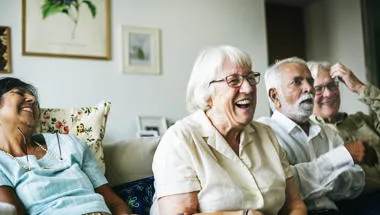
The Sciences of Ageing and the Culture of Youth, 1880 to the present day
The Sciences of Ageing and the Culture of Youth (SAACY) is a project funded by a UK Research and Innovation Future Leaders Fellowship. It will offer a conceptual framework with which to overcome cultural pessimism about ageing and influence policy change.

The Centre for the Humanities and Health
A multidisciplinary forum interfacing the humanities, health, science & society.
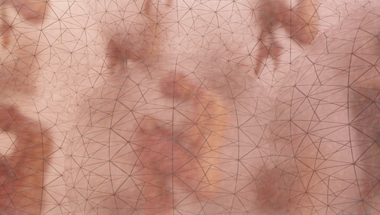
Centre for Technology and the Body
Stories of embodied technology: from the plough to the touchscreen

Ageing Research at King's (ARK)
Cross faculty consortium addressing ageing and healthy longevity.
News
Research on ageing launches at the House of Lords
Society needs to tackle pessimism around ageing for people to live and age well, argues a new report by the Sciences of Ageing and the Culture of Youth...
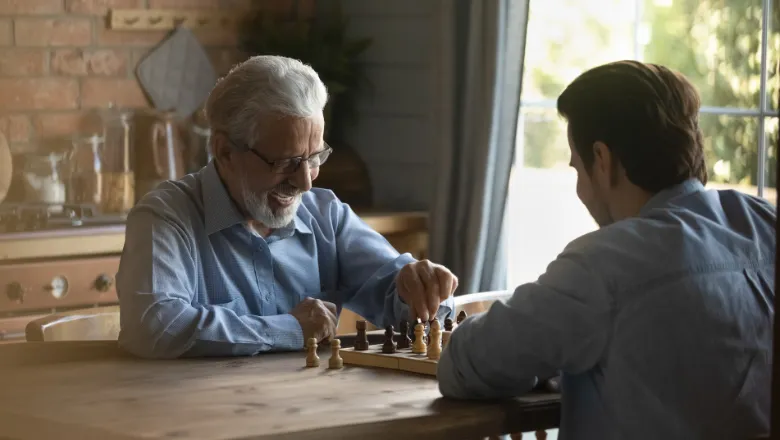
Cross-sector workshop explores the lifelong process of ageing
Researchers at King’s organise a discipline- and sector-crossing workshop around the idea of lifelong ageing.
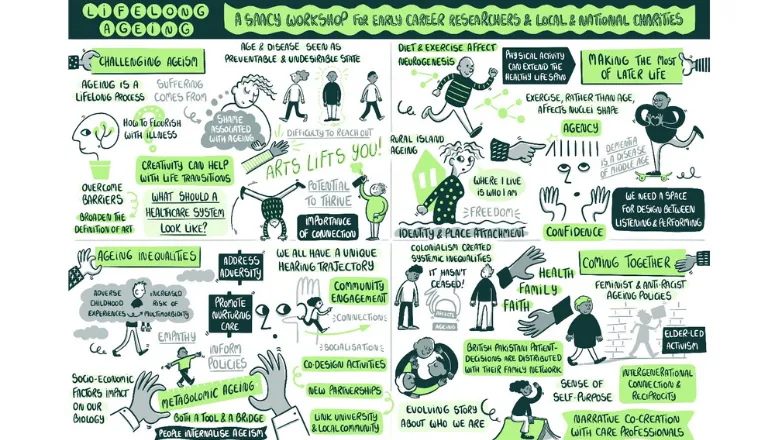
Little has changed in four decades of dementia care, finds King's study
A new study has found ineffective co-ordination of services and fragmented care plans in England has resulted in very little improving for dementia carers in...
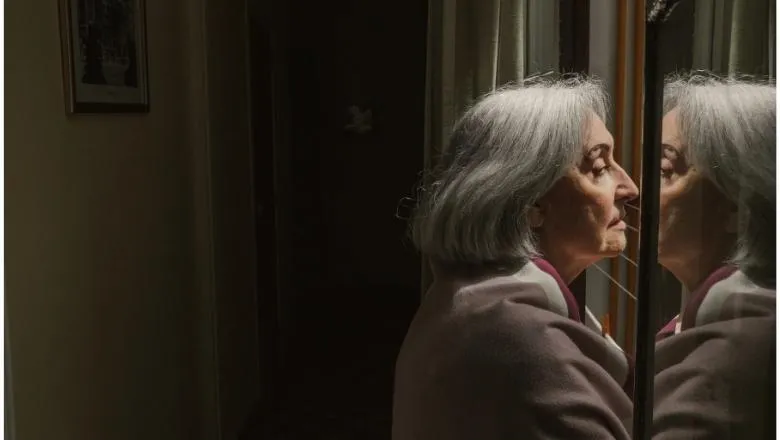
Events

SLSAeu 2025/SAACY Conference - The Lifespan: Perspectives on Ageing and the Life Course from the Medical Humanities, the Health Sciences and Age Studies
We are excited to announce that SAACY is hosting the SLSAeu Conference at King’s College London in June 2025.
Please note: this event has passed.

SAACY at the Literature and Science Forum
Dr Martina Zimmermann was invited to speak in the Winter Series: Medical and Digital Humanities of the Literature and Science Forum, where she presented on a...
Please note: this event has passed.

Panel on Breaking Down Barriers to Opportunity at the Foundation for Science and Technology Annual Conference
Panel discussion on one of the five missions of the newly elected government.
Please note: this event has passed.

Panel on Literature and Science at the International Conference of Three Societies on Literature and Science
Panel discussion on ‘Literature and Science: The State of the Field’ at the online event for all delegates of the International Conference of Three Societies...
Please note: this event has passed.

SAACY at InCommon
Martina presents about the Policy Report, Shifting How We View the Ageing Process at a Lunch and Learn event at the London-based charity InCommon
Please note: this event has passed.

Cognitive Augmentation in Speculative Writing
SAACY at the International Conference of Three Societies on Literature and Science, Birmingham
Please note: this event has passed.

Annual Conference of the German Studies Association of Ireland
Changing How We Think About Ageing: Narrativity/Episodicity in Stories of Dementia and Ageing
Please note: this event has passed.
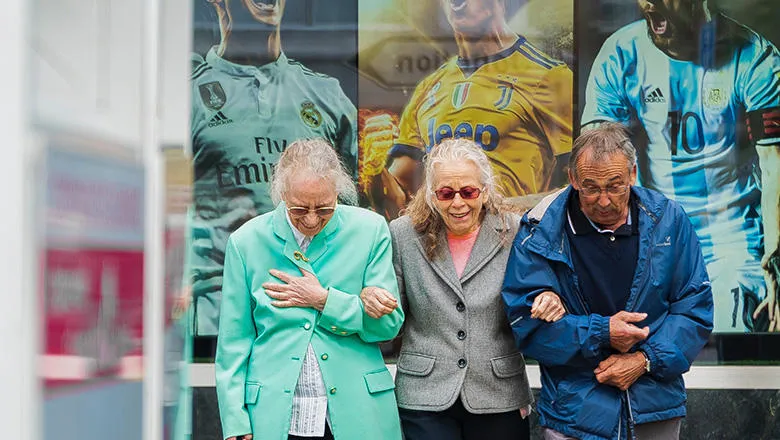
SAACY at the WDFF Health and Wellbeing Conference
Martina was invited at the Warwick District Faiths Forum Health & Wellbeing conference and discussed SAACY's research activities
Please note: this event has passed.

SAACY at Age UK
Martina presents about the Policy Report, Shifting How We View the Ageing Process
Please note: this event has passed.

Shifting How We View the Ageing Process
In this invited talk at the Centre for Ageing Better, Martina spoke about the Policy Report related to a Policy Lab, which the SAACY team had run together...
Please note: this event has passed.
Features
An Agenda for the Medical Humanities and Ageing: Joining up life-/medical sciences, social sciences and the humanities
Achieving attitudinal change to ageing would have far-reaching implications for how we retire, treat and care for older people, fund research and care, and...

Lifelines: Rethinking Ageing across Generations
Dr Martina Zimmermann shares her opening address from the launch of Lifelines: Rethinking Ageing Across Generations.

Shifting How We View the Ageing Process: A Policy Report published as part of the SAACY research programme
The first Policy Report of the CHH-hosted research programme on ageing, The Sciences of Ageing and the Culture of Youth (SAACY), has been published this...

Lifelong Ageing: A discipline- and sector-crossing event hosted by CHH
The Sciences of Ageing and the Culture of Youth (SAACY), a research programme on ageing funded by a UKRI Future Leaders Fellowship, aims to offer a conceptual...

Co-producing Ageing Research Blog
Co-producing Ageing Research was a half-day workshop we ran at Science Gallery London in May this year.

Spotlight on UKRI Future Leaders Fellowship
Martina Zimmermann was interviewed by Susanna Cornick-Willis on the 19 January 2023

Informal Dementia Care: Policy and Practice
One of SAACY’s premisses is that cultural pessimism about ageing shapes perceptions of the worth and value of human beings and directs decisions about care,...

The first SAACY Policy Report: Shifting How We View the Ageing Process
In September this year, we completed the Report of a first SAACY-related Policy Lab, which we had run together with the Policy Institute at King’s in Autumn...

The Origins of SAACY
The first blog post about The Sciences of Ageing and the Culture of Youth, 1880 to the present day (SAACY), a research programme funded by a UK Research and...

Research

The Sciences of Ageing and the Culture of Youth, 1880 to the present day
The Sciences of Ageing and the Culture of Youth (SAACY) is a project funded by a UK Research and Innovation Future Leaders Fellowship. It will offer a conceptual framework with which to overcome cultural pessimism about ageing and influence policy change.

The Centre for the Humanities and Health
A multidisciplinary forum interfacing the humanities, health, science & society.

Centre for Technology and the Body
Stories of embodied technology: from the plough to the touchscreen

Ageing Research at King's (ARK)
Cross faculty consortium addressing ageing and healthy longevity.
News
Research on ageing launches at the House of Lords
Society needs to tackle pessimism around ageing for people to live and age well, argues a new report by the Sciences of Ageing and the Culture of Youth...

Cross-sector workshop explores the lifelong process of ageing
Researchers at King’s organise a discipline- and sector-crossing workshop around the idea of lifelong ageing.

Little has changed in four decades of dementia care, finds King's study
A new study has found ineffective co-ordination of services and fragmented care plans in England has resulted in very little improving for dementia carers in...

Events

SLSAeu 2025/SAACY Conference - The Lifespan: Perspectives on Ageing and the Life Course from the Medical Humanities, the Health Sciences and Age Studies
We are excited to announce that SAACY is hosting the SLSAeu Conference at King’s College London in June 2025.
Please note: this event has passed.

SAACY at the Literature and Science Forum
Dr Martina Zimmermann was invited to speak in the Winter Series: Medical and Digital Humanities of the Literature and Science Forum, where she presented on a...
Please note: this event has passed.

Panel on Breaking Down Barriers to Opportunity at the Foundation for Science and Technology Annual Conference
Panel discussion on one of the five missions of the newly elected government.
Please note: this event has passed.

Panel on Literature and Science at the International Conference of Three Societies on Literature and Science
Panel discussion on ‘Literature and Science: The State of the Field’ at the online event for all delegates of the International Conference of Three Societies...
Please note: this event has passed.

SAACY at InCommon
Martina presents about the Policy Report, Shifting How We View the Ageing Process at a Lunch and Learn event at the London-based charity InCommon
Please note: this event has passed.

Cognitive Augmentation in Speculative Writing
SAACY at the International Conference of Three Societies on Literature and Science, Birmingham
Please note: this event has passed.

Annual Conference of the German Studies Association of Ireland
Changing How We Think About Ageing: Narrativity/Episodicity in Stories of Dementia and Ageing
Please note: this event has passed.

SAACY at the WDFF Health and Wellbeing Conference
Martina was invited at the Warwick District Faiths Forum Health & Wellbeing conference and discussed SAACY's research activities
Please note: this event has passed.

SAACY at Age UK
Martina presents about the Policy Report, Shifting How We View the Ageing Process
Please note: this event has passed.

Shifting How We View the Ageing Process
In this invited talk at the Centre for Ageing Better, Martina spoke about the Policy Report related to a Policy Lab, which the SAACY team had run together...
Please note: this event has passed.
Features
An Agenda for the Medical Humanities and Ageing: Joining up life-/medical sciences, social sciences and the humanities
Achieving attitudinal change to ageing would have far-reaching implications for how we retire, treat and care for older people, fund research and care, and...

Lifelines: Rethinking Ageing across Generations
Dr Martina Zimmermann shares her opening address from the launch of Lifelines: Rethinking Ageing Across Generations.

Shifting How We View the Ageing Process: A Policy Report published as part of the SAACY research programme
The first Policy Report of the CHH-hosted research programme on ageing, The Sciences of Ageing and the Culture of Youth (SAACY), has been published this...

Lifelong Ageing: A discipline- and sector-crossing event hosted by CHH
The Sciences of Ageing and the Culture of Youth (SAACY), a research programme on ageing funded by a UKRI Future Leaders Fellowship, aims to offer a conceptual...

Co-producing Ageing Research Blog
Co-producing Ageing Research was a half-day workshop we ran at Science Gallery London in May this year.

Spotlight on UKRI Future Leaders Fellowship
Martina Zimmermann was interviewed by Susanna Cornick-Willis on the 19 January 2023

Informal Dementia Care: Policy and Practice
One of SAACY’s premisses is that cultural pessimism about ageing shapes perceptions of the worth and value of human beings and directs decisions about care,...

The first SAACY Policy Report: Shifting How We View the Ageing Process
In September this year, we completed the Report of a first SAACY-related Policy Lab, which we had run together with the Policy Institute at King’s in Autumn...

The Origins of SAACY
The first blog post about The Sciences of Ageing and the Culture of Youth, 1880 to the present day (SAACY), a research programme funded by a UK Research and...

